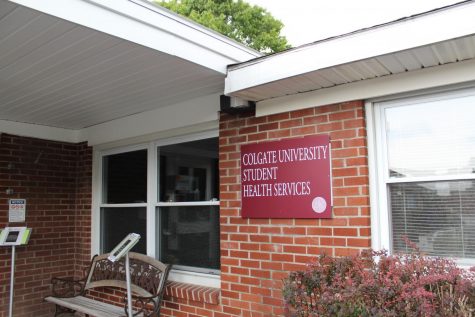Colgate Goes Test-Optional for Next Year’s Applicants
The University will be test-optional for applicants in the Fall of 2021 due to COVID-19’s impact on scheduled standardized testing through the spring and summer. Vice President for Admission and Financial Aid Gary Ross announced the decision in an email to the University website on April 9.
“This is the latest in a series of steps that the University has taken to support the needs of applicants, especially in these extraordinary times,” Ross said.
Colgate joins the long list of colleges and universities across the nation that have made the switch to test-optional for the fall of 2021 after SAT and ACT testing dates were canceled, according to a New York Times article. The list includes many of Colgate’s peer liberal arts institutions, such as Amherst College and Middlebury College, as well as other public and private universities across the country like all University of California campuses. However, many Ivy League and elite institutions, including Harvard, Stanford and Yale, have not made changes to their testing policy as of the publishing of this article.
The decision to move to test-optional admission responds to concerns that students will not have access to standardized tests before the application process. Students often take standardized tests multiple times before submitting scores, a process that takes multiple months of in-person testing and often significant financial commitment.
The New York Times article explains that the College Board has now canceled all SAT and SAT Subject testing dates through June. Testing is scheduled to resume in August with one testing date per month through the end of 2020, if deemed safe by health experts. ACT administrators have postponed the April 4 testing date until June 13 and plan to continue with their normal testing calendar, should restrictions be lifted.
First-year Ava Golden said she believes the University’s decision is only fair.
“In my experience, the score that I used was from the ACT I took in April. These students won’t have that opportunity,” Golden said. “Some students may have been preparing to take the ACT in the spring or summer, so they should not be penalized for something that was out of their control.”
First-year Eliza Trainer echoed Golden’s sentiment, noting how the inequity and financial burdens of testing have been exacerbated by the current situation.
“The accessibility of testing is now limited, and the fees of testing may pose a financial burden on some parents who are newly unemployed. Colgate’s decision to switch to test-optional during these uncertain and unprecedented times is a compassionate and pragmatic choice,” Trainer said.
Senior JJ Citron said she feels this inequity of standardized testing raises questions of whether the change should be permanent.
“I think the SAT is tough because, on one hand, it’s considered the one standard metric of comparison. This does not, however, mean that the SAT is an equalizer by any means. It is biased towards those who can afford extra preparation. I think depending how this round of application considerations go, then Colgate can consider whether it is feasible to go test-optional completely,” Citron said.
Over the past decade, an increasing amount of universities and liberal arts colleges in particular have permanently altered their testing policies for applicants. Bowdoin College was the first to be officially test-optional in 1969. In June of 2018, The University of Chicago announced that it would become test-optional, and many of Colgate’s peer Liberal Arts institutions, such as Colby College, have since followed the lead.

Ethan Cherry is a senior from Baltimore, MD studying political science and architecture. He has previously served as multimedia manager, news editor, assistant...










